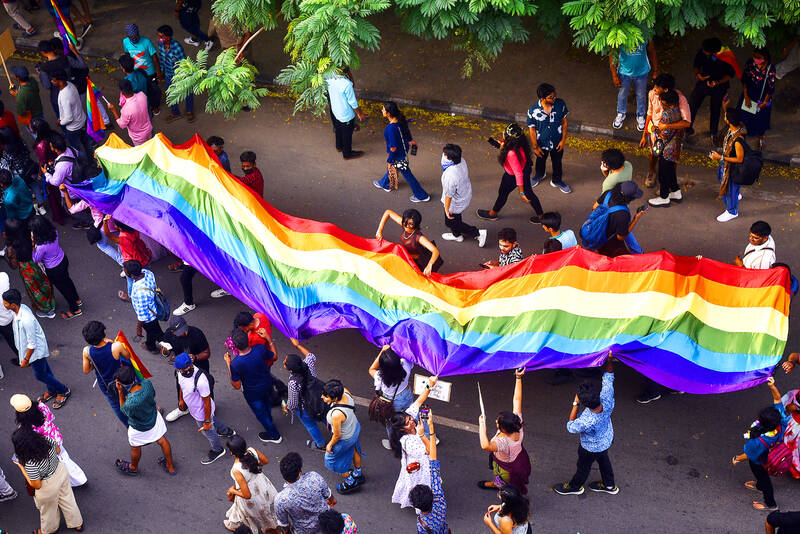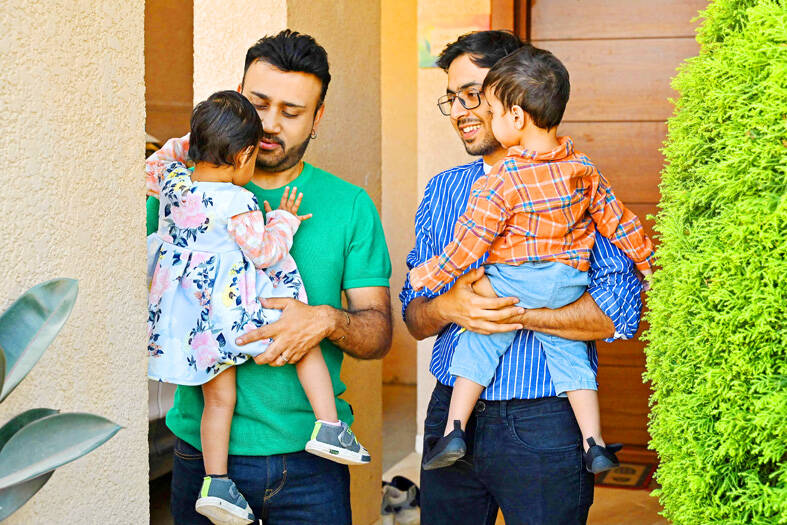When the Indian Supreme Court earlier this year started hearing a case to legalize same-sex marriage, matchmaker Kamakshi Madan suddenly received an increase in enquiries from parents seeking spouses for their LGBTQ+ children.
“I had mothers calling me looking for husbands for their sons,” Madan, a specialist matchmaker for the LGBTQ+ community, said by telephone from Pune, in western India.
A ruling to allow same-sex couples to marry would be a huge boost to the LGBTQ+ wedding industry in the country of more than 1.4 billion people, where families often spend the equivalent of tens of thousands of dollars on lavish ceremonies that can last for several days.

Photo: EPA-EFE
Indians spend one-fifth of the total wealth accumulated in their lifetime on their weddings in a 1 trillion rupee (US$12.1 billion) industry, loan provider Reliance Money said.
Some same-sex couples have been tying the knot unofficially since India decriminalized homosexuality in 2018, exchanging vows before families and friends in unrecognized ceremonies.
If India legalizes gay marriage in the coming months, it would become only the third place in Asia to do so after Taiwan and Nepal.

Photo: AFP
The government has said it opposes recognizing same-sex marriage and urged the Supreme Court to reject challenges to the legal framework lodged by LGBTQ+ couples. A ruling is expected this year, although the court has not announced a date.
The issue of gay marriage is sensitive, as speaking openly about homosexuality is taboo for many Indians.
However, attitudes are shifting. Fifty-three percent of Indian adults say that same-sex marriage should be legal, found a report released last month by the Pew Research Center, a polling and research organization.
Previous Ipsos Group SA polls found that 29 percent supported same-sex marriage in 2015 and 44 percent in 2021.
Madan, whose clients call her “the LGBTQ+ Sima aunty” in reference to the popular Netflix reality show Indian Matchmaking, said she has witnessed growing acceptance among parents and families firsthand.
“I have had a father from a [conservative] background call and say: ‘Please find a bride for my daughter,’” said Madan, who set up her matrimonial and counseling company Aarzoo in 2018.
Saurabh Bondre, a Sanskrit academic who officiates non-legally binding traditional Hindu weddings for gay and lesbian couples, said that legalizing same-sex marriage would assuage priests’ fears about legal disputes or boycotts.
“Many professional Hindu priests are actually not against performing such weddings. They are fearful of a backlash from within the priest community,” Bondre said.
“If you perform a same-sex wedding, you may not get [invited to carry out] straight weddings afterwards, costing you your livelihood,” he said.
Bondre, who is a member of the LGBTQ+ community, said that many same-sex couples want traditional religious marriage ceremonies, in line with cultural norms.
“We see our uncles, aunts, cousins and friends reiterating their love for each other,” he said. “We also dream that we will have a similar commitment.”
Sameer Sreejesh, founder of LGBTQ+ matrimony app Umeed, said that the Supreme Court case had prompted a rush of LGBTQ+ people across the country to openly admit their sexual identities and seek life partners.
The app’s daily downloads had doubled since the marriage equality court hearings began on April 18, he said.
“We’re adding more than a hundred members every day, even though we’re spending less than before on ads,” Sreejesh said.
Umeed has about 20,000 registered members and 5,000 to 6,000 active members daily.
Although the app makes a small profit of a few thousand rupees a month from memberships, Sreejesh said he anticipates huge growth.
“If the verdict comes in our favor, there are millions of people waiting,” he said.

UNCERTAINTY: Innolux activated a stringent supply chain management mechanism, as it did during the COVID-19 pandemic, to ensure optimal inventory levels for customers Flat-panel display makers AUO Corp (友達) and Innolux Corp (群創) yesterday said that about 12 to 20 percent of their display business is at risk of potential US tariffs and that they would relocate production or shipment destinations to mitigate the levies’ effects. US tariffs would have a direct impact of US$200 million on AUO’s revenue, company chairman Paul Peng (彭雙浪) told reporters on the sidelines of the Touch Taiwan trade show in Taipei yesterday. That would make up about 12 percent of the company’s overall revenue. To cope with the tariff uncertainty, AUO plans to allocate its production to manufacturing facilities in

TAKING STOCK: A Taiwanese cookware firm in Vietnam urged customers to assess inventory or place orders early so shipments can reach the US while tariffs are paused Taiwanese businesses in Vietnam are exploring alternatives after the White House imposed a 46 percent import duty on Vietnamese goods, following US President Donald Trump’s announcement of “reciprocal” tariffs on the US’ trading partners. Lo Shih-liang (羅世良), chairman of Brico Industry Co (裕茂工業), a Taiwanese company that manufactures cast iron cookware and stove components in Vietnam, said that more than 40 percent of his business was tied to the US market, describing the constant US policy shifts as an emotional roller coaster. “I work during the day and stay up all night watching the news. I’ve been following US news until 3am

COLLABORATION: Given Taiwan’s key position in global supply chains, the US firm is discussing strategies with local partners and clients to deal with global uncertainties Advanced Micro Devices Inc (AMD) yesterday said it is meeting with local ecosystem partners, including Taiwan Semiconductor Manufacturing Co (TSMC, 台積電), to discuss strategies, including long-term manufacturing, to navigate uncertainties such as US tariffs, as Taiwan occupies an important position in global supply chains. AMD chief executive officer Lisa Su (蘇姿丰) told reporters that Taiwan is an important part of the chip designer’s ecosystem and she is discussing with partners and customers in Taiwan to forge strong collaborations on different areas during this critical period. AMD has just become the first artificial-intelligence (AI) server chip customer of TSMC to utilize its advanced

Six years ago, LVMH’s billionaire CEO Bernard Arnault and US President Donald Trump cut the blue ribbon on a factory in rural Texas that would make designer handbags for Louis Vuitton, one of the world’s best-known luxury brands. However, since the high-profile opening, the factory has faced a host of problems limiting production, 11 former Louis Vuitton employees said. The site has consistently ranked among the worst-performing for Louis Vuitton globally, “significantly” underperforming other facilities, said three former Louis Vuitton workers and a senior industry source, who cited internal rankings shared with staff. The plant’s problems — which have not